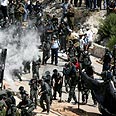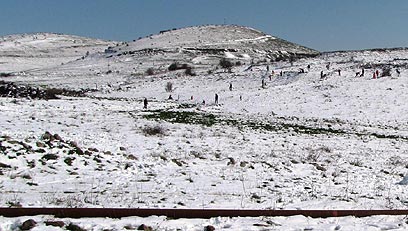

During the last few days we have all seen the "camel advert" and other broadcasts from the Ministry of Information and Diaspora, which remind us of the "Third World" image we have earned around the globe. In addition, we have all been asked to learn how to make Israel look better abroad, via a website specially set up for this purpose.
However, a perusal of the site reveals that many of the opinions we are supposed to learn by rote are not part of any consensus. In fact, they mainly reflect the rightwing side of the political spectrum, which currently dominates.
For example, part of the site is dedicated to "exploding myths" which present Israel in a negative light. One such "myth" is the claim that we can't reach peace because of the settlements – an erroneous claim, according to Ministry staff, it seems: "The root of the Arab-Israeli conflict does not lie in the size of the state, but in the very fact of its existence. Tel Aviv and Jerusalem are also likely to be seen by Arabs as settlements," they write.
Israelis abroad, they say, should emphasize that 25 settlements were evacuated during the disengagement from the Gaza Strip in 2005, and that this took place "despite our historic right to the land." The dozens of settlements still in place are completely ignored.
While the argument over the construction freeze continues, both between Israel and the Palestinians and within Israeli itself, Israelis – according to the Ministry of Information – are not supposed to have any doubts regarding their legitimacy. "The settlements renew ancient Jewish settlement, and their creation does not involve uprooting any Arabs," the Ministry asks Israelis to emphasize. "Most of the Arab towns and villages in Judea and Samaria have biblical names, and are testimony to Jewish roots in this area."

Judea and Samaria the 'Golan Heights of Tel Aviv'. (Photo: Tsafrir Abayov)
The site also supplies some examples of Arab towns founded on the site of ancient Jewish settlements to prove "who was here first", as they put it.
Israelis are also requested to make it clear to their audience abroad that the term "Palestine" has no historical existence, as the late Arab-American historian Prof. Philip Hitti has said (and he is quoted on the site).
Learn by rote: Golan vital to Israel
On the site, the hills of Judea and Samaria are called "the Golan Heights of Jerusalem, Tel Aviv and the coastal plain," and the site notes that "many people say that hundreds of Arab tanks on the coastal plain will put an end to the entire Jewish state," which is why the Judean hills are so important, to stop any possible enemy advance.

Golan Heights critical to Israel's security. (Photo: Oren Yehuda)
The site also quotes the chief of the Operations Branch during the American invasion of Iraq in 1991, who said that "it is not possible to defend Israel without control of the hills of Judea and Samaria."
After laying the grounds for the main claim, the site can then explain why Israel does not withdraw to the Green Line. Here too the writers use a range of quotes which do not question Israel's right to avoid any withdrawal.
Even former US President Lyndon Johnson is recruited, with a quote from September 1968: "It is clear that withdrawal to the borders of June 4, 1967 will not bring peace. The borders must be secure and recognized."
Eugene Rostow, one of the formulators of UN Resolution 242, is also quoted as saying that the resolution authorizes the sides to agree on territorial changes, but does not require complete or partial withdrawal from the occupied territories. The peace agreement with Egypt, Rostow noted, gave the Arabs 90% of the territories conquered in the war.
And what about the Golan Heights, which have returned to the headlines in recent weeks due to the exchange of threats between Israel and Syria? The Ministry of Information needs no referendum, nor even a government vote. "Even in the age of ballistic missiles, it is crucial that Israel retains the Golan Heights," the site asserts, and advises that Israelis explain how the Yom Kippur war proved that the central Golan mountain range was critical in ensuring Israel's security.
And for Israelis who want to put in a few words for "Greater Israel," the site offers the following: "Gaining the Golan Heights renewed Israel's connection to Jewish heritage and the ancient history of the Jewish nation on the Golan, from God's promise to Abraham, through the settlement of the land, Gamla, and the Jewish presence in Talmudic times, all the way up to the first moshavot of Baron Rothschild in the eastern Golan Heights."
Were there any deaths in the October riots?
The dictionary of the Israeli-Palestinian conflict is also misleading in its definitions, and offers a rather partial picture of reality.
Remember the October 2000 riots? So does the Ministry of Information. Partly, anyway: "The violence of the Al-Aqsa Intifada led to riots also within the Israeli-Arab sector, as a token of sympathy. These riots continued for three days, accompanied by the blocking of major roads and stone throwing." Where are the 13 Arabs who were killed during clashes with the police?
And what about the Orr Commission, set up specially to investigate the events? "Among the causes that led to violence," the site asserts, "were the religious radicalization of Arab Israelis, the increase in identification with the Palestinians, and the incitement of local leaders against Israel."
The commission's call for wiping away the stain of discrimination against Arab Israelis and to work immediately for complete equality with the direct involvement of the prime minister has been erased from the dictionary.
The organization Peace Now has appealed to Prime Minister Benjamin Netanyahu to take down the website. "Israel's positions as presented on this site reflect an extreme rightwing ideology, and are not even in keeping with your own statements at Bar-Ilan University regarding two states for two peoples," wrote Yariv Oppenheimer, who heads the organization.
The Ministry of Information and Diaspora responded by saying, "It saddens us that instead of taking part in the important national effort to improve Israel's image, which 85% of Israeli citizens support, according to a survey, you have chosen to take a number of quotes and use them in a negative campaign against Israel."
The Ministry also noted that the site, which was launched just four days ago, "has already had over 130,000 visitors and we have had enthusiastic responses and requests for training from citizens. However, as noted on our position paper which accompanies the campaign, the site is liable to changes which will be carried out according to requirements."















